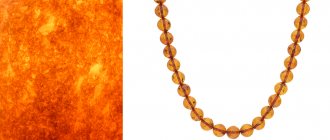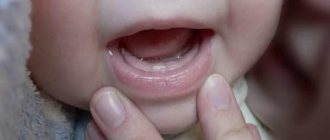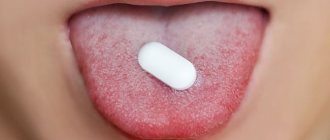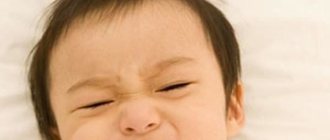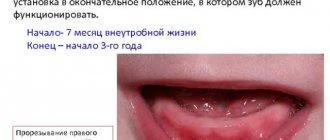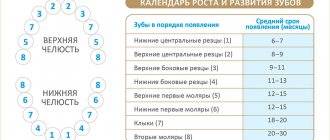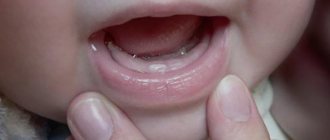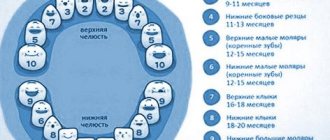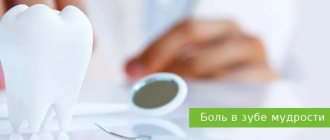What to do if teeth do not erupt “on time”?
Nothing to do. As stated earlier, the timing is quite relative and not strict data. There is such a thing as the individual characteristics of a child. Plus neonatal indicators, physical constitution, etc. Thus, the timing of the appearance of teeth in your child is normal for him. The same applies to permanent teeth.
The later the teeth appear, the healthier they will be?
Is not a fact. The timing of teething does not affect their “quality”.
What sedatives can be used during teething? Do they influence the process itself?
No, such drugs do not affect the process of teeth formation and, as a rule, have no side effects. For children with allergies, there is a sedative called Doctor Baby that does not contain lidocaine. Almost all gels contain lidocaine and inert fillers (cooling menthol, astringents and flavoring additives). You can use Dentinox, Kalgel (be careful with diathesis, because it is sweet), Kamistad (very effective, but you need to know when to stop), Mundizal, Cholisal, Solcoseryl dental paste (especially good in the presence of wounds or ulcers).
How often should such drugs be used?
Soothing gels are not antibiotics and do not need to be used according to a specific regimen. If the child is in pain, apply it, but if everything is calm, don’t. But it’s better not to use it more than 3-4 times a day and for longer than 3 days in a row.
PREVENTION OF TEETH GRINDING
Since doctors have established a relationship between bruxism and the state of the nervous system, it is necessary to organize the baby’s routine in advance so that there are no prerequisites for overexcitation and stress. The child needs daily walks for 3-4 hours. This time can be divided into 2 stages.
You need to stick to the routine. The baby should eat, walk and sleep at the same time. You should not feed your baby at night. Digestive processes that take place at night will worsen the quality of sleep and make it restless. For the same reason, active games in the evening are not recommended. Let the child frolic on the street during the day; in the evening you can occupy him with quiet games or read him a fairy tale.
Warm baths with the addition of herbal decoction are good for relaxation. The child's nutrition should be complete and varied, fully replenishing the deficiency of vitamins and minerals. It is advisable to give your baby more fresh vegetables and fruits. It is better to exclude sweets from your diet.
If the pathology in the form of teeth grinding was identified in a timely manner and the child received appropriate treatment, the prognosis is favorable. In the future, it is necessary to monitor compliance with the regime and the psycho-emotional state of the baby. Children undergoing treatment for bruxism should visit the dentist at least 2 times a year. The doctor will be able to immediately notice the return of symptoms if this happens.
Is it possible to speed up teething?
Medication - no. But massaging your gums won't hurt at all. Using a clean finger, gently and gently massage your baby's gums. The baby will feel better, and the tooth will cut through faster. Just do not press hard so as not to injure the gums. You can give your child a cool spoon or pacifier to hold in his mouth. Try buying special teethers with liquid. They are placed in the refrigerator for a while, and then given to the child to chew on. All these methods are good in moderation, do not overdo it.
Can bad breath occur during teething and what is the cause?
The process of teething is associated with partial decomposition (lysis) of the mucous membrane under the action of salivary enzymes. We all notice that the amount of saliva increases sharply during this period. In this case, indeed, indicators such as viscosity, color and smell of saliva may change. Another factor is the presence of weak antibacterial substances in saliva, which are designed to prevent infection of the wound when a tooth cuts through the gum. A certain amount of blood also enters the oral cavity. When it decomposes, a sour (metallic) odor may appear.
A sharp increase in temperature during teething. What to do?
Teething does not cause a temperature jump to 39-40 degrees. Only a slight increase is possible, which is normal. Be careful: teething should not cause high fever, diarrhea, vomiting, complete loss of appetite, cramps or choking. If you have such symptoms, even if you attribute it to your teeth, consult a doctor. It is also not recommended to use antipyretics and painkillers without consulting him.
What is the difference between an increase in temperature due to teething and an increase due to other reasons? How long can the elevated temperature last in the first case?
It all depends on the individual characteristics of the child. Basically, hyperthermia and diarrhea are only secondary signs of the teething process, which in itself is a serious physiological turning point for a small organism. Fever is, rather, a reaction to inflammation of the oral mucosa. After all, at the site where the tooth exits, irritation forms, often a wound that can become infected. Thus, hyperthermia is caused not by the mechanism of tooth formation itself, but by side effects. After all, the eruption of permanent teeth, despite the similarity of histological and physiological changes, causes symptoms of colds and diarrhea extremely rarely. And it is quite simple to explain their appearance in children: changes in diet and diet, constant foreign objects in the mouth, microflora disturbance, weakened immunity in the nasopharynx. So, if high fever and loose stools continue for more than 72 hours, then teething really has nothing to do with it.
GRINDING OF TEETH IN YOUR SLEEP – ARE WORMS TO BE TO blame?
Grinding your teeth in your sleep has an official medical term – bruxism. Doctors do not consider this phenomenon a disease; it would be more accurate to call it a condition that can arise for various reasons. For a long time, even educated people seriously believed in the myth that bruxism is caused by helminthic infestation.
Mothers passed on to each other by word of mouth advice to give their child an anthelmintic drug. However, in reality, teeth grinding at night has nothing to do with worm infection. The authoritative pediatrician Dr. Komarovsky has repeatedly tried to debunk this misconception. Worms can be present in the body of any child, regardless of whether he grinds his teeth or not.
In the case of helminthic infestation, the symptoms will be completely different:
- stomach ache;
- headache;
- unstable appetite;
- attacks of nausea and vomiting;
- bowel dysfunction (constipation alternating with diarrhea);
- itching in the anus.
The baby's skin may become pale and dark circles appear under the eyes. The child experiences weakness and shows irritability. A blood test can indirectly confirm helminthic infestation. Worm eggs are detected during clinical examination of stool.
As for bruxism, it is caused by various pathological conditions not related to parasitic infection. You can get rid of this symptom in a child only by eliminating the original cause, but this must be done. In some cases, children grind their teeth so much that they wear them down and this becomes a serious problem. Sometimes parents hear a terrible grinding sound even from the next room.
Teeth grinding is caused by repetitive movements of the lower jaw and chewing muscles. Bruxism is divided into nighttime (uncontrolled), daytime (partially controlled) and combined. The pathology occurs in approximately one third of all preschool children. Currently, bruxism has not been sufficiently studied, but work in this direction is constantly being carried out.
Teething in infants
Possible characteristics of teeth in children at the teething stage. Stay up to date.
The expansion of the spaces between the teeth is caused by the growth of the jaws. During the transition from baby teeth to permanent teeth, it is considered a normal condition. A wide gap between the upper anterior incisors is usually associated with a deep-lying maxillary frenulum. An orthodontist should observe and treat such a gap between the teeth;
- a blackish edging on the neck of the tooth can form when taking soluble iron supplements, as well as during a chronic inflammatory process (precipitation of bacteria from the leptotrichium group);
- yellowish-brown staining of teeth may be associated with the use of antibiotics - by the mother in the 2nd half of pregnancy or by the child himself during the formation of teeth;
- yellowish-greenish coloring is caused by severe disturbances in bilirubin metabolism, hemolytic conditions (destruction of red blood cells);
- reddish staining of tooth enamel is characteristic of a disease called porphyria - a congenital disorder of the metabolism of porphyrin pigment;
- malocclusions are formed by the uneven growth of the child’s jaws, as well as prolonged sucking of the nipples;
- Anomalies in the location of teeth occur for a number of reasons: trauma, congenital disorders of connective tissue metabolism, constitutional reasons (small jaw size), tumors of the alveolar process of the jaw.
- the absence of teeth before one year of age is extremely rarely associated with edentia (lack of tooth buds), which can be checked using radiovisiography as prescribed by a pediatric dentist.
If teeth erupt on time and in a certain order, this indicates the normal development of the child’s body. After all, this physiological process is in direct connection with the general health of the baby. Some atypical cases may indirectly indicate the presence of pathology. But only a special examination of the child can confirm or refute the assumptions made. The reasons must be identified and analyzed by a specialist.
Causes of night toothache
To find out why teeth hurt at night but not during the day, you need to know the main factors contributing to the occurrence of this disease. Practicing medical professionals identify the following main reasons:
- Violation of the integrity of the tooth crown.
- Painful reaction to a decrease or increase in temperature (occurrence of caries).
- Severe swelling of the gums and, as a result, an increase in body temperature (flux).
- Persistent pain in the upper jaw (sinusitis).
- Acute toothache radiating to the temporal region (pulpitis, wisdom tooth periodontitis).
- Various dental injuries.
- Inflammatory processes of the middle ear.
- The appearance of acute purulent processes in the jaw.
Aching toothache at night feels more painful than during the daytime. This factor is explained by physiological and psychological manifestations. The first are associated with strengthening or weakening the functioning of organs directly related to the condition of the teeth. The developing swelling compresses the nerve approaching it. This sharply increases the pressure in the internal part. And as a result, severe pain appears.
By morning they may weaken or disappear altogether. Experts associate this with the functioning of the adrenal glands. These organs are responsible for stopping the development of inflammatory processes. In the morning hours they are especially active and efficient. Thanks to their positive effects, painful phenomena do not appear so strongly. In the evening and at night, special hormones that suppress pain processes are not released. A person experiences persistent sensations that cause general harm to health.
During the daytime, a person is busy almost the entire period. He is surrounded by everyday hassles and problems, whether he is working or studying. He has no time to think about the present toothache. Even if it is activated, it does not cause unpleasant consequences against the backdrop of a busy daytime.
At night, especially before five o’clock in the morning, the body is in a completely relaxed and unprotected state. The reaction to any, even the most minor, pain and inflammation increases. A person perceives any influence very sensitively. Accordingly, toothache intensifies at night.
